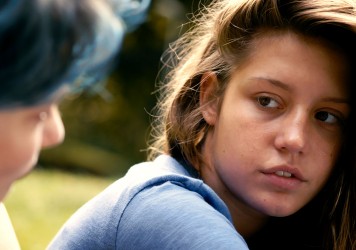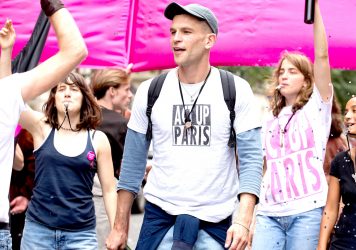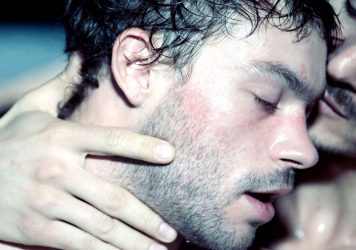Nothing happens for a very long time in Abdellatif Kechiche’s follow-up to Blue is the Warmest Colour.
Cut! Move on. Hurry the hell up. Get a shift on. Holds up wrist, taps watch with a look of stark bewilderment. Can we please get this train moving? We have some patience-bothering on a Olympic level here with Abdellatif Kechiche’s billowing slab of sun-blissed windbaggery, Mektoub, My Love: Canto Uno, a somewhat belated follow-up to his 2013 Palme d’Or-winner, Blue is the Warmest Colour.
He is a writer-director who is known for taking his good sweet time with things. He builds up characters, delicately cultivates plot-strands, fleshes out micro dramas and whips them to the point of blissful hysteria. Creative partners have constantly afforded him the gift of extended runtimes for his work, perhaps denoting the sense of earth-shattering gravitas to which his stories so often convey.
He is empowered to indulge. And indulge he has. Mektoub feels like a sick personal dare, or a stealthy broadside pre-aimed at negative criticism, whereby Kechiche has attempted to string out what feels like a short film’s worth of material to nearly three, excruciatingly banal hours. It’s a malevolent act of art film trolling.
It’s not that the characters are dull, the performances weak, or the setting uninteresting, but that Kechiche insists on a militantly non-interventionist stance whereby there’s no trace that he is shaping a story or contriving a situation that tacitly connects one scene to the next. If there is some subtle underpinning or connective tissue which makes the material feel even vaguely coherent or satisfying, then this viewer most certainly missed it. It’s not incoherent so much as it is incontinent.
Maybe it’s an attempt to build a boundless, borderless surreal epic from the building blocks of hard-edged realism? Maybe it’s an attempt to create a work of behavioural ethnography where we can carefree French twentysomethings in their natural habitat? Whatever it is, the results are eye-wateringly dull, if not formally intriguing. It comes as a shock to discover that this was actually inspired by the 2012 novel ‘La Blessure, la Vraie’ by François Bégaudeau (writer and star of Laurent Cantet’s 2008 film The Class), as it presents itself as something closer to freewheeling documentary.
Shaïn Boumedine plays Amin, a self-appointed cerebral overseer and sensitive soul who spends the entire film with a shit-eating grin plastered across his face while he nods along and refuses to say anything of interest to the various people (mostly scantily clad women) with whom he comes into contact. More exciting is Ophélie (Ophélie Bau), a carefree and disarmingly unselfconscious old pal he reconnects with shortly after witnessing her in the midst of a sweaty sexual bunk-up with Amin’s cousin Tony (Salim Kechiouche).
Amin is down in the southern beach town of Sète having dropped out of medical school. He hangs out in the Tunisian community with his family, dossing on the beach, necking shots in in the club, watching his wolfish pals grind up against any female flesh that will allow it, taking a few photos of farm animals, and that’s pretty much the size of it. Kechiche doesn’t even really commit to suggesting that he’s the main character, as he so often sinks into the backdrop.
As with Blue is the Warmest Colour, Kechiche’s camera snakes and slithers up and down the bodies of his female cast members. The director, unwittingly or otherwise, characterises himself as a randy voyeur – the type of person who would head to a nudist beach, alone, armed with a spy camera, but claim to be on some higher intellectual mission. The occasional use of classical music might make us believe that he is connecting his lithe subjects to the rippling, denuded statues of antiquity, but after the 20th time the camera dips below the equator to get a good eyeful of Bau’s ass, you feel the theory doesn’t have legs.
So it’s a big old bomb, then. But the strangest news is that this is the proposed first part in a trilogy of films. If Kechiche does decide he wants to follow through on this exercise in audience alienation (please! No more clubbing sequences! Make it stop!), let’s all cross fingers, toes and everything else that he’s given some stricter boundaries the next time around.
Published 14 Feb 2019
It's been a long wait for a new film by Kechiche. Festival reviews were middling.
A film in which every dull scene stretches on for five times longer than it needs to. Painful.
Hardest of hard passes for Canto Dos.

Abdellatif Kechiche’s passionate lesbian love story is a screen romance that’s built for the long-haul.

Robin Campillo’s stirring AIDS activist drama is a vital reminder of the power of protest.

By Ella Kemp
This passionate debut from Camille Vidal-Naquet boldly challenges our perceptions of male sex workers.